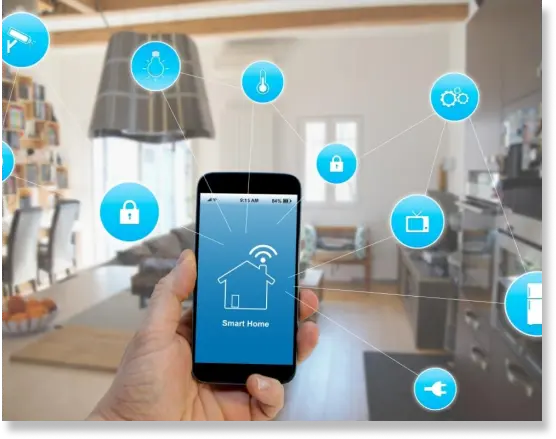Case Study | 24 July 2025
How a Consumer Electronics Company Transformed Its Smart Appliances by Utilizing Data-Driven Innovation Strategies
Posted by : Akshay Pardeshi
In an era where smart appliances are redefining how consumers interact with their homes, staying ahead of technological trends and changing user expectations has become a critical success factor for manufacturers. This case study explores how a global consumer electronics company overcame innovation stagnation and market misalignment by leveraging a customized, research-driven strategy. With a focus on consumer behavior, competitive benchmarking, and emerging technology integration, the company changed its product development approach, ultimately enhancing customer satisfaction, accelerating growth, and securing a stronger foothold in the smart home ecosystem.

An overview:
With the convergence of digital connectivity, automation, and artificial intelligence, the global consumer electronics environment is undergoing a significant transformation. Smart appliances ranging from AI-powered refrigerators to app-controlled washing machines have become mainstream as consumers increasingly seek convenience, energy efficiency, and inter-device compatibility. According to recent projections, the smart appliance market is expected to reach a value of over USD 76 billion by 2027, registering a CAGR of more than 16% during the forecast period. Consumers are not only buying smarter products but also expecting brands to deliver intuitive design, seamless integration with digital ecosystems, and real-time personalization.
In such a fast-evolving and competitive landscape, companies must go beyond traditional product development. They need research-backed strategies to stay coordinated with consumer expectations and integrate cutting-edge technologies into their offerings. This case study explores how a customized Research Nester solution helped a global electronics brand innovate in line with changing market dynamics, achieving growth through intelligent product design.


The Story
Our client is a global leader in the home appliances and consumer electronics sector, with a strong hold in over 50 countries. Known for producing high-quality refrigerators, washing machines, dishwashers, and smart ovens, the company has been at the forefront of technological innovation for over three decades. Their strategic vision emphasizes improving lifestyles through connected living experiences. However, the client faced new challenges as consumer expectations changed rapidly in the post-pandemic era. The rise of smart homes, remote control functionalities, and sustainability concerns created an urgent need to reassess their product strategy. A few of the challenges faced are mentioned as follows:
- Evolving Consumer Expectations: The client observed a noticeable shift in consumer demand, from utility-based appliances to multifunctional, AI-integrated devices. Consumers expected personalized features, voice assistant compatibility, and self-diagnostic capabilities, but the company's existing product roadmap lacked the agility to meet these evolving preferences.
- Delayed Innovation Efforts: While the company maintained a strong hold in traditional appliance markets, it struggled to keep up with newer entrants and startups in the smart appliances space. Disruptors were introducing app-based, data-optimized devices that provided more value and adaptability.
- Inconsistent Product Focus: Older internal studies did not offer proper consumer behavioral insights. Product updates relied on outdated assumptions rather than real-time information, resulting in slower adoption and lower product satisfaction in smart categories.
- Technology Integration Challenges: Despite having access to top-tier R&D resources, the client struggled to identify which emerging technologies, such as AI-based load sensors or IoT-integrated dashboards, were most aligned with consumer expectations and feasible for imminent adoption.
Our Solution:
To address these complicated challenges, Research Nester executed a tailored multi-phase research solution. The goal was to close the gap between market trends, consumer behavior, and innovation potential. The service comprised four key elements:
Consumer Behavior Tracking: A detailed behavioral study was conducted across key regions, targeting urban, tech-savvy users most likely to adopt smart appliances. Our researchers used focus groups, mobile surveys, and user diaries to extract patterns in product usage, preferences, and dissatisfaction points. Key insights revealed that consumers valued energy efficiency, voice commands, predictive maintenance alerts, and seamless app interfaces above all. Additionally, Gen Z and Millennial buyers prioritized brands that offered sustainability and low carbon footprints.
Technology Trend Analysis: Research Nester analysts monitored over 75 emerging technologies in the smart appliances field. These included edge computing for faster processing, AI-powered predictive diagnostics, and integration with Google Home and Alexa. The team analyzed each technology based on:
- Ease of integration into the client’s latest product establishment.
- Alignment with consumer expectations.
- Competitive advantage relative to rivals’ offerings.
- A dynamic scoring model was built to emphasize features for R&D investment.
Marketing Benchmarking: A thorough market intelligence study covered 10 global competitors and 15 innovative startups. This included analysis of product launches, patents filed, brand positioning, and customer sentiment on digital platforms.
Insights suggested that while major competitors focused on aesthetic appeal and app interfaces, only a few were providing genuine predictive diagnostics or AI-personalization, creating an opportunity for differentiation.
Innovation Framework & Go-to-Market Plan: Based on the data collected, an actionable roadmap was formulated. It showed:
- Product upgrades in phases with immediate, mid-term, and long-term feature integration.
- Sustainable features such as energy monitoring dashboards and recycled-material components.
- Partnerships with IoT systems and smart assistant providers for swift introduction.
- Region-specific marketing approaches for early adopters.


Results
- Rapid Product Innovation: Within just six months of engagement, the client redesigned its best-in-class washing machine model to integrate predictive maintenance, voice-activated controls, and environmentally friendly wash cycles. The appliance received widespread attention at tech expos and increased its category share by 22% year-over-year.
- Improved Customer Satisfaction and Loyalty: Following the reintroduction, net promoter scores (NPS) advanced by 36 points, and product returns dropped by 19%. User reviews cited ease of use, automation, and modern design as the top reasons for satisfaction.
- Optimized R&D Investment: The prioritized technology roadmap helped the client decrease R&D spending on underperforming features by 29%, redistributing funds to more effective innovations such as smart AI sensors and app interoperability.
- Market Expansion in Smart Segments: With targeted marketing and regional customization, the client successfully stepped into three new markets with smart-enabled appliances, recording a sales increase of 42% in Asia-Pacific and 35% in the EU.
- Stronger Brand Perception: The brand was recognized as a Smart Home Innovation Leader by many industry platforms. Social media engagement and product unboxing reviews surged, with a 60% rise in organic mentions and influencer collaborations.
Conclusion
This transformational process showcases the value of integrating real consumer insights with forward-looking technological vision in today’s hyper-connected world. By applying Research Nester’s personalized research services, the client not only embraced the changing smart appliance landscape but also successfully reshaped its core value proposition. Through supportive decision-making, customer-centric innovation, and strategic technology integration, the company successfully restored its innovation edge, enhanced market responsiveness, and positioned itself as a future-ready firm. As consumer needs constantly grow, this advanced and research-driven approach stands as a blueprint for sustainable success in the competitive smart devices industry.
customized message

Akshay Pardeshi is an accomplished Senior Research Analyst at Research Nester, with over 6 years of experience driving strategy, innovation, and client success across niche industrial domains. His sectoral expertise spans IT & Telecom (cloud technologies, cybersecurity, AI, IoT, 5G infrastructure), Electronics & Smart Devices (consumer electronics, smart home systems, wearables, semiconductors), and BFSI & Allied Services (digital banking, fintech, insurance tech, and IT services).
Akshay specializes in translating complex data into clear, actionable intelligence that informs strategic decision-making. His expertise spans competitive intelligence, market sizing, industry and customer research, trend analysis, and strategic forecasting. He is widely recognized for his rigorous research approach, structured analytical thinking, and ability to deliver high-impact insights that directly support business strategy and growth initiatives.
Akshay holds a Bachelor’s degree in Electronics, which provides a strong scientific and analytical foundation for his work. Throughout his career, he has demonstrated a consistent focus on accuracy, depth of insight, and client-centric delivery. In addition to his analytical strengths, he is highly skilled in project management and team leadership, enabling him to manage complex research engagements efficiently while ensuring timely, high-quality outcomes for stakeholders.
Thank you for contacting us!
We have received your request for proposal. Our research representative will contact you shortly.
Copyright @ 2026 Research Nester. All Rights Reserved.

